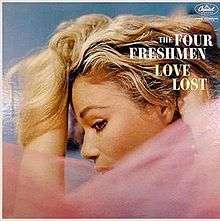Love Lost (album)
Love Lost is a studio album, released on June 11, 1959,[1] by jazz vocal and instrumental group The Four Freshmen. Released at the height of their fame, the album is now considered a "vintage" recording.[2] In the same year, The Four Freshmen won both the Metronome and Playboy polls as top jazz vocal group.[3]
| Love Lost | ||||
|---|---|---|---|---|
 | ||||
| Studio album by | ||||
| Released | 1959 | |||
| Recorded | 1959 | |||
| Genre | Vocal jazz | |||
| Label | Capitol | |||
| The Four Freshmen chronology | ||||
| ||||
The album was reissued in 1998 on a double CD with Voices in Love.[4]
Track listing
- “Love Lost” (Bob Flanigan, Don Barbour, Ross Barbour, Ken Albers)
- “Spring Is Here” (Richard Rodgers, Lorenz Hart)
- “I'm a Fool to Want You” (Joel Herron, Frank Sinatra, Jack Wolf)
- “I Should Care” (Axel Stordahl, Paul Weston, Sammy Cahn)
- “I Could Have Told You” (Jimmy Van Heusen, Carl Sigman)
- “If I Ever Love Again” (Russ Carlyle, Richard Reynolds)
- “The Gal That Got Away” (Harold Arlen, Ira Gershwin)
- “When Your Lover Has Gone” (Einar Aaron Swan)
- “I Wish I Didn't Love You So” (Frank Loesser)
- “I Wish I Knew” (Harry Warren, Mack Gordon)
- “I'll Never Smile Again” (Ruth Lowe)
- “Little Girl Blue” (Richard Rodgers, Lorenz Hart)
Personnel
- Don Barbour – vocals
- Ross Barbour – vocals
- Bob Flanigan – vocals
- Ken Albers – vocals
Vocal arrangements Dick Reynolds and Ken Albers
Music arranged by Dick Reynolds
Notes
- allmusic on "Love Lost"
- Carr, p. 268.
- Feather, p. 218.
- Birchmeier, Jason. "The Four Freshmen: Voices in Love/Love Lost". AllMusic. Retrieved May 2, 2020.
gollark: Directly connect wires to the happy chemical producing brain regions.
gollark: Just take illegal happy drugs, *obviously*.
gollark: Illegal.
gollark: u0 cannot be instantiated.
gollark: What if I have a function which returns u8, but REALLY it will only return 3 or 86 in practice?
References
- Carr, Ian; Fairweather, Digby; and Priestley, Brian. The Rough Guide to Jazz: 3rd Edition. London: Rough Guides, 2004.
- Feather, Leonard. The Encyclopedia of Jazz. New York: Horizon Press, 1960.
This article is issued from Wikipedia. The text is licensed under Creative Commons - Attribution - Sharealike. Additional terms may apply for the media files.